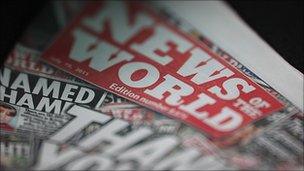Leveson report: Newspapers reject press regulation plans
- Published
- comments

The newspaper industry has rejected a plan for press regulation agreed by the three main political parties in the wake of the Leveson Inquiry.
The newspapers opposed the idea of a regulator backed by a royal charter, and have revealed an alternative plan.
It is closely based on the draft charter agreed after the Leveson report into press standards - but without "state-sponsored regulation".
Campaigners said it showed the industry had "learned nothing" from Leveson.
The Guardian and the Independent are the only two titles out of 11 national newspapers that have not signed up.
The government's royal charter, published on 18 March, has "no support within the press" and has been condemned by media freedom organisations, said a statement released by the Newspaper Society, on behalf of a number of national and local newspapers.
The newspapers also argue that they had no say in the final discussions.
Prime Minister David Cameron said there was all-party agreement around the published charter but he was "always very happy to look at other proposals".
However, BBC political correspondent Norman Smith said government sources are saying their plans "will not be dropped" in favour of the newspaper industry package.
'Widespread backing'
The industry's proposal is closely based on the draft royal charter published on 12 February following negotiations with national and local newspapers and magazines.
Industry sources told BBC political correspondent Ross Hawkins the industry-backed press regulator would not apply for formal recognition under the government's royal charter plans and it will not apply to be the official regulator.
This throws open the post-Leveson debate as politicians cannot force the papers to engage with their plan, our correspondent said.
The risk for politicians is the newspapers' plan could see the press regulating itself once more, under a rulebook it designed - and this is unlikely to appease the public or victims, he said.
The newspapers' proposals are different from the government-backed scheme for England and Wales in that they:
- Remove Parliament's power to block or approve future changes to regulation. Instead the regulator, trade bodies and a newly-created "recognition panel" would have to agree to changes
- Would see the chair and members of the panel selected by an appointments committee chaired by a retired Supreme Court judge, and include one representative of the industry's interests, one member representing the public interest and one public appointments assessor nominated by the Commissioner for Public Appointments for England and Wales
- Remove a ban on former editors sitting on the panel
- Give newspaper and magazine readers a say on the industry's proposals
- Make it more difficult to bring group complaints
- Change the power of the regulator to "direct" the nature, extent and placement of corrections and apologies, saying it should "require", not "direct"
The industry described it as "a workable, practical way to swiftly deliver the Leveson recommendations... without any form of state-sponsored regulation that would endanger freedom of speech".
Editors have lined up to back the proposals.
Tony Gallagher, of the Daily Telegraph, tweeted: "Can anyone possibly be surprised we have rejected Lab-Lib-Hacked Off stitch up[?]"
In a statement on News International's website, Sun editor Dominic Mohan said it was "a workable solution which should command public confidence".
Acting editor of the Times John Witherow described the proposals for self-regulation as robust but said they would not affect press freedom.
Peter Wright, editor emeritus of Associated Newspapers, told BBC Radio 4's The World at One: "We recognise that the most important thing we have to do is to get an effective new regulator up and running, and we need to have the support of political parties in this.
"The clear preference is for a royal charter... that is in line with Leveson regulations."
Neil Wallis, a former executive editor of the News of the World, said the press was honouring the spirit of the Leveson report but wanted to prevent politicians having a say in regulation.
Meanwhile, the chairman of the Commons culture committee chairman, John Whittingdale, said the plans were a "constructive development".
The Conservative MP said he hoped neither side would stick "rigidly" to their plans and there was now the possibility of producing a "charter which everyone can support".
'Desperate move'
But campaign group Hacked Off said in a statement: "This desperate move by editors and proprietors… is only the latest proof that most of the industry has learned no lessons from the Leveson experience.
"They are not sorry for the abuses exposed at the inquiry... and they do not accept the need for real change."
The industry statement said the charter would deliver:
- Tough sanctions - with the new regulator able to impose fines of up to £1m for systematic wrongdoing
- Full and prominent correction of inaccuracies
- Strong investigative powers enabling the new regulator to investigate wrong-doing and call editors to account
- Genuine independence from the industry and from politicians, with all the bodies making up the new regulator having a majority of independent members appointed openly and transparently
- Public involvement in the framing of the code of practice which binds national and local newspapers and magazines
Lawyers representing the papers said they had formally petitioned the Privy Council, which meets next month, to consider the issue.
A spokesman for the Department of Culture, Media and Sport said: "We want to see a tough independent self-regulator implemented swiftly.
"The royal charter published on the 18 March, followed 21 weeks of discussion and has cross-party agreement."
Labour deputy leader Harriet Harman said: "The important thing is that we get on with implementation."
But London Mayor Boris Johnson tweeted: "Press proposing alternative royal charter on regulation - keeps best of Leveson but free from political interference."